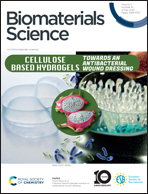T cell-loaded injectable chitosan scaffold shows short-term efficacy in localised cancer immunotherapy in mice†
Abstract
Adoptive cell therapy (ACT) shows success against treatment-resistant cancers, but is limited by the large number of intravenously delivered T cells required and toxicity related to systemic administration. In this work, we hypothesized that localized T cell delivery in an in situ gelling chitosan hydrogel will allow similar treatment efficacy despite delivering fewer cells than systemic intravenous delivery. A rapidly gelling chitosan gel with good mechanical properties was used for this study. Gel biocompatibility and biodegradability were tested over 8 weeks in mice. No adverse effects were observed. The gel elicited a local granulomatous reaction (foreign body reaction), degrading by about 75% volume at 8 weeks. The survival, escape and bioactivity against the tumour cells of encapsulated murine lymphocytes (OT-I) and human Jurkat cells were confirmed in vitro by live/dead assay and flow cytometry. Efficacy was studied using a mouse tumour model where the injected OT-I can specifically recognize and attack ovalbumin (OVA) protein-expressing tumours. The OT-I cell delivery scaffold was compared to untreated controls, OT-I in saline and intravenous systemic treatment with 3-fold more OT-I, observing tumour growth and localization by intravital microscopy and histology. Gel-encapsulated OT-I limited tumour growth significantly up to 11 days after treatment compared to that of untreated mice and mice with longer PBS-suspended OT-I treatment (9 days), but slightly less than that of mice with IV-delivered OT-I treatment (14 days). No significant difference was observed when directly comparing the gel and IV treatments. Although further optimization of the treatment is required, this work shows the feasibility and potential of the chitosan gel for localised OT-I delivery in cancer immunotherapy.



 Please wait while we load your content...
Please wait while we load your content...